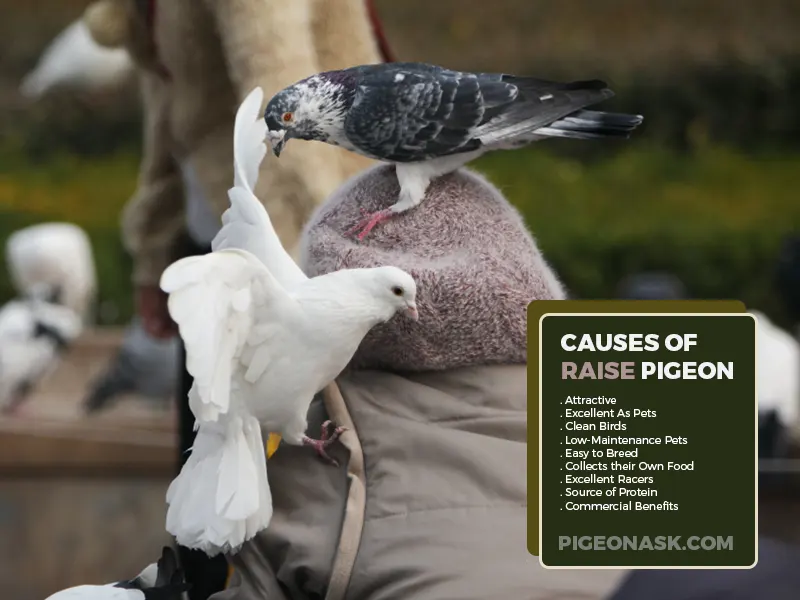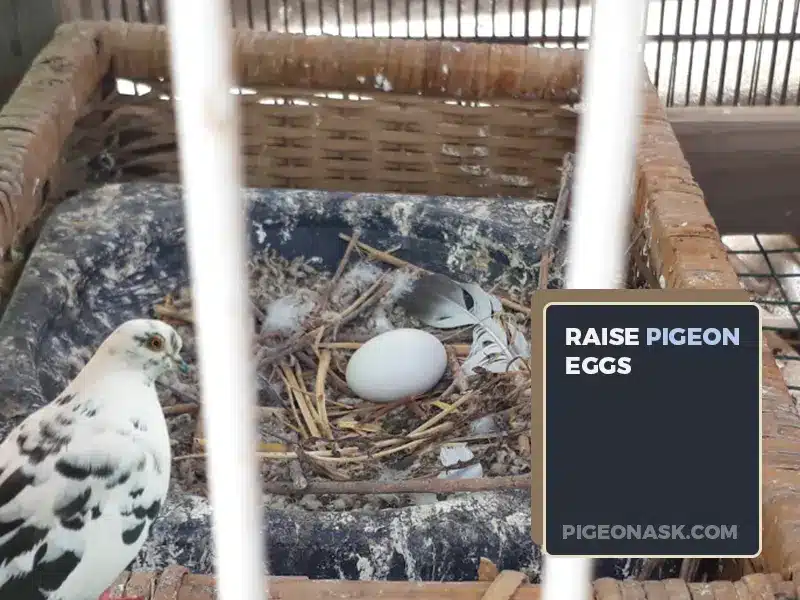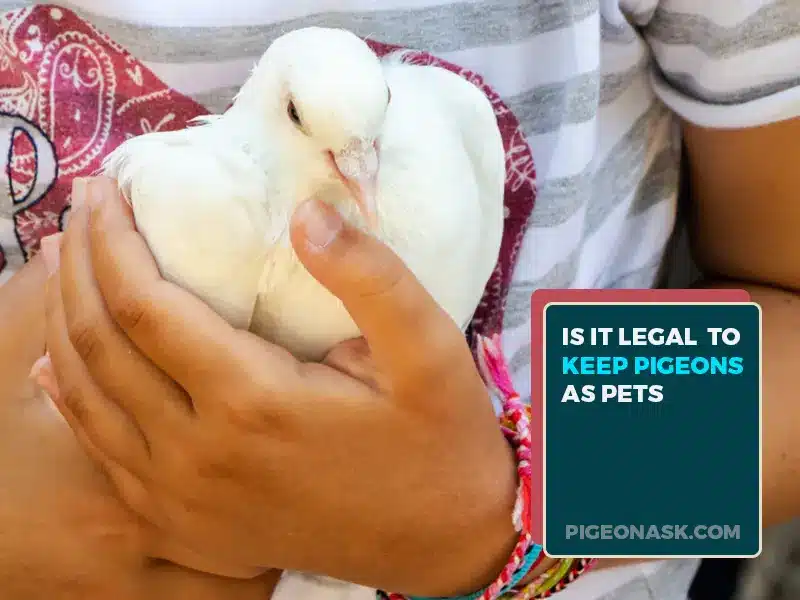Why Do People Keep Pigeons?
Pigeon-keeping, also known as pigeon fancying, has been a popular hobby and pastime for centuries. These birds have been domesticated and bred by many hobbyists around the world.
Ever wondered why do people keep pigeons? Pigeons are mainly kept as pet birds due to their loyal nature, attractive appearance, and unique characteristics. These birds are valued for their innate ability to find their way back to their home loft which makes them excellent racing birds.
Also, pigeons are low-maintenance pets that provide meat and egg. Gardeners raise them to control pests and as a source of producing fertilizer. Want to learn more? Keep reading!
Interested in similar topics on pigeon blogs:
9 Reasons Why People Raise or Keep Pigeons
If you’ve ever owned any pigeon species, you already know how charming these birds are. This is the main reason why many people are attracted to them.

Below are the common reasons why people keep pigeons and breed them –
01. Pigeons are Attractive
There are very few birds as beautiful and elegant as pigeons. Most people prefer pure white breeds as they look majestic when they move. Pigeons come in a variety of colors and patterns, from the common gray rock pigeon to the more exotic breeds with vibrant colors and intricate feather patterns.
Some pigeon breeds, such as the fantail pigeon, are known for their striking appearance and are highly prized by bird fanciers.
Apart from their attractive appearance, pigeons are often appreciated for their graceful movements and distinctive cooing sounds.
02. Excellent As Pets
Many people find pigeons to be charming and enjoyable pets. They are known for their unique personalities, curious nature, and social behaviors. These birds are fun companions.
Besides, pigeons are highly social animals and enjoy spending time with their owners and other birds. They are also intelligent and can learn to perform tricks or even respond to basic commands with training.
While pigeons are not as commonly kept as pets as dogs or cats, they can still make rewarding and enjoyable companions for those who are interested in these unique and fascinating birds.
03. Pigeons are Clean Birds
Contrary to popular belief, pigeons are generally clean animals, and they do clean themselves regularly. Like most birds, they have a preen gland at the base of their tail that produces oil. Pigeons spread the oil over their feathers using their beaks. This helps to keep the feathers healthy and waterproof.
Also, pigeons take dust baths to keep their feathers clean and free of parasites. During a dust bath, a pigeon will roll around in dust or fine sand, which helps to remove excess oil, dirt, and debris from its feathers.
While pigeons do take care of their own grooming to some extent, it’s still important to provide them with a clean and hygienic living environment and access to fresh water for bathing.
04. Low-Maintenance Pets
One of the advantages of keeping pigeons as pets is that they are relatively low-maintenance compared to some other pets. They don’t require daily walks or playtime, and they are generally easy to feed and care for.
What’s more, you don’t need to make any fancy living place for pigeons. They only require a suitable living space that allows them to move around freely and engage in natural behaviors such as flying and roosting.
Unlike other pets, the cost of buying pigeons is very low, starting from a few dollars only. Other regular costs of keeping pigeons include such as food, supplements, bedding, and medical care. Pigeons eat almost all types of food and are less prone to diseases, so you don’t have to spend much to raise pigeons as pets.
05. Easy to Breed
As pigeons are prolific breeders and capable of reproducing throughout the year, breeding pigeons can be relatively easy. For successful breeding, all you have to do is to provide a suitable nesting area that’s secure, clean, and well-ventilated.
They also need access to a healthy and nutritious diet, as well as fresh water for drinking and bathing.
On average, most pigeon breeds reach sexual maturity between 6 and 8 months of age. Pigeons typically lay a clutch of 2 eggs which takes only 18 days to hatch. The young pigeons are cared for by their parents for several weeks until they can fend for themselves.
06. Collects their Own Food
No need to worry about feeding your pigeons every day, as pigeons are capable of foraging and collecting their own food in the wild. They often scavenge for food scraps or grain spilled on the ground.
However, if you keep pigeons as pets, it is important to provide them with a balanced diet that meets their nutritional needs.
Pigeons are omnivorous and typically eat a variety of foods, including grains, seeds, fruits, and insects. So it’s relatively easier to fulfill their nutritional needs.
07. Excellent Racers
Thanks to their inborn desire to return home, pigeons are often raised and trained for racing competitions. Pigeon racing is a popular hobby around the world, where trained racing pigeons are released from a specific location and race back to their home loft.
The speed and accuracy of their return are measured, and the pigeons that perform the best are typically awarded prizes. Racing pigeons are usually selectively bred for their endurance, speed, and navigational abilities.
Such races can be over relatively short distances, such as 100 miles, or they can be much longer. In fact, some races cover distances of 500 miles or more. Good racing pigeons are often sold for thousands of dollars.
08. Good Source of Protein
If cooked properly, pigeon meat can be an excellent source of protein, minerals, and many other nutrients. Pigeon meat is lean and flavorful, with a texture that is similar to chicken.
From a nutritional perspective, pigeon meat is a good source of protein, vitamins, and minerals. A 100-gram serving of pigeon meat provides approximately 17 grams of protein. Pigeon meat is also a rich source of vitamins B6, and B12. [Reference]
In terms of minerals, it contains significant amounts of iron, zinc, and phosphorus.
09. Offers Many Commercial Benefits
Many people keep pigeons considering their commercial benefits. Adult pigeons are sold in pairs, and some racer breeds can be particularly valuable. Besides, pigeon eggs are also prized in some cultures, with a reputation for being rich and flavorful.
As pigeons scavenge on small insects, many raise them to control pests in their fields and farms. Pigeon poop, also known as pigeon guano, can be used as a fertilizer. Pigeon guano is high in nitrogen, phosphorus, and potassium. All these elements are essential nutrients for plant growth.
Why Did People Keep Pigeon Coops?
Back when people initially started domesticating pigeons, they would keep coops to accommodate their pigeons. This happened primarily because, during the winter season, large birds would migrate away and would be unavailable for consumption.

Keeping them in a coop helped make them comfortable in the new environment. This way, it was easier to domesticate them. In general, when new pigeons were brought home, people kept them locked inside the coop for at least two weeks. Coops are also great for providing a safe and secure living space for pigeons.
In all cases, coops provided a comfortable environment for pigeons to live and thrive. Coops also protect them from predators, provide shelter from the weather, and give them a sense of security. This practice of keeping the pigeons in coops continued for a long time until laws were made for their preservation.
Why Do Some People Raise Pigeons on Rooftops in Cities?
People raising pigeons on rooftops come from the old urban culture.
The reasons behind why people raise pigeons in rooftops are as follows –

- People who breed, keep and train pigeons on the rooftops raise their pigeons to be racers and high flyers.
- Pigeons, in general, like to set up their coop high up to escape from predators.
- They are also trained to maneuver down with the help of chirps and whistles.
- The same method is used to train pigeons to make formations and control their movement.
All of these can only be done at the convenience of a rooftop.
Why Do You See Many Pigeons in the City?
Even though many pigeons still live and thrive in the wild, it isn’t uncommon to see pigeons everywhere in cities. Some say that pigeons prefer making their houses on concrete, marble, or stone because it’s safer than trees and shrubs.
But the truth is that so many pigeons live in cities because the people brought them here. As people migrated and built their great cities, they also built houses for their pigeons.

Starting from 5000 years ago in Mesopotamia to today in New York City, the pigeons still fly above the city they call home.
It was much later, after people gave their pigeons a home, as they discovered that owning a pigeon has more applications.
First, they were used as a messenger and, later on, used as a source of food and entertainment. Not to mention the abundance of scraps of food pigeons pick on the streets of New York, starting from bread and bagel to even rice and other flakes.
Hence, men saw the potential to keep the city cleaner with the help of these little birds. Overall, pigeons in the cities are raised by people who search for loyal companions and unique pets.
How Do You Raise Pigeon Eggs?
If you’re thinking about raising pigeon eggs, then things might get a little complex from here on out. You have to maintain a very specific range of humidity and temperature to hatch a pigeon egg.
The optimal temperature for raising pigeon eggs is 99-99.5 degrees Fahrenheit. And the humidity needs to be about 55 to 60%.

Throughout the incubation process, you must maintain a stable temperature. You can use a heat lamp or incubator to maintain the temperature.
Always keep an eye on the egg to ensure that it’s developing properly. The egg should be rotated several times a day to prevent the yolk from sticking to the shell. You need to flip sides from time to time to make sure the whole egg receives equal warmth constantly.
Keep the humidity at 60% for the first 2-3 days. After that, you have to increase the humidity to 70-75% until the egg hatches.
Remember, it takes about 18 days for a pigeon egg to hatch. Be patient and continue to monitor the egg during this time.
Are You Allowed to Keep Pigeons As Pets?
If it’s about permission, then it is best to ask your guardians or parents whether they will allow you to keep pigeons as pets. However, as far as legality goes, it is within the law to keep pigeons as pets.
According to the American Legal Publishing code 6-3E-2, you’re allowed to keep and breed pigeons. However, you need to ensure the proper safety and maintenance of the birds.

In certain countries like the UK, you may require a license to keep a wild animal as a pet. Not for pigeons, though! Some cities, like Joondalup in Australia, require you to apply for a Certificate of Registration to the City first.
As the laws vary in different regions of the world, it’s better to check out your local laws regarding bird keeping before you keep a pigeon at your house.
What Do You Need to Know to Raise a Pigeon?
Your task is very minimal if you plan on taking up the mantle of being a pigeon owner. Here is a list of factors that you need to keep in check −

- Ensure sufficient food and sterile water for your pigeons every day.
- Remember to keep their coop or nest clean.
- Always split up sick pigeons or ill-looking pigeons from healthy ones.
- If your pigeons are to lay eggs, then remember to disperse the leaves in their nest, or else the eggs may never hatch. This is because pigeons often forget about the eggs they can’t see. So, if an egg is hiding under a leaf, then it might never be attended to.
Conclusion
So, now you know why do people keep pigeons. People raise these birds for various reasons, including racing, exhibiting, and simply as a good source of meat. Above all, pigeons can make good pets if you have the time, space, and commitment to care for them properly.
They are intelligent, social, and can form strong bonds with their owners. What else can you ask for?
That’s all for this article. We hope you found what you were looking for! If you did, then a share would be appreciated. We’re on Facebook, Twitter & Pinterest. Stay connected with us.
Image Credit:
- Canva.com/photos
